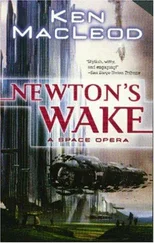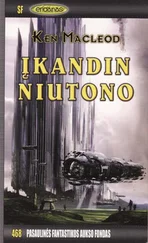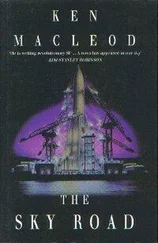“I see.” Grant didn’t sound happy.
Atomic returned with two mugs and two plates with meat pasties. Horrocks tasted. “Very good,” he said. He’d forgotten how hungry he was.
Grant leaned over and took a chunk of Atomic’s pasty. “Horrocks says he’s here to deliver a message to you.”
“I’m not surprised,” said Atomic. “I bet it’s from my rocking caremother, yes?”
Horrocks put down his mug so that it didn’t splash. “Yes,” he said. “In a manner of speaking. She convinced me of something, and asked me to convince you of it.”
“Well, what is it? That you and I are destined to be soulmates?”
“What?”
“Oh, I know her,” said Atomic. “She’s an incorrigible genetic speculator. When she sent me her used dress, I knew a boy couldn’t be far behind.”
Horrocks didn’t know where to look. He thought her very forward. It must be the city life. Only a few months ago she’d thought him uncouth for mentioning her genetic parentage, and now she talked like this! At least she hadn’t said “a used boy.” He ate another bite or two with a dry mouth, sipped coffee.
“It’s nothing like that!” he said. “Well, I can’t be sure of her intentions, but—”
“She sent you on some quite different pretext? That’s her way.” She stretched across the table to brush a crumb from Grant’s lip.
“No,” said Horrocks. “This isn’t a pretext. This is really important.”
“So spit it out”
“All right,” he said. “The aliens, the bat people, are at a stage of development very similar to that of our ancestors in the age of world wars. Internal-combustion engines, radio, the beginnings of television, airships, steamships, mass urbanisation. In at least one city, the probe has detected traces of crude attempts to concentrate radioactive isotopes.”
“Yes, and?”
“Some of the founder generation think the aliens too may be on the brink of an era of war.”
Atomic stared at him. Grant rapped a finger hard on the table.
“Speculation,” he said. “And wooden-headed technological determinist speculation, at that. We know nothing of the aliens’ social relationships, apart from the apparent slavery — which incidentally is far more widespread than at the same stage in human development, which rather undercuts your suggestion. They could be a single world empire, or a federation of anarchies, or a happy global cooperative commonwealth for that matter. We just don’t know.”
“What about the slaves?” asked Atomic. “Don’t they count?”
“We don’t even know they are slaves,” said Grant. “They could be beasts — very similar animals to the dominant species but without speech or self-awareness.”
“Hah!” said Atomic.
“Excuse me,” said Horrocks. “That’s beside the point.”
“And the point is?” said Grant.
“The point is, if these bat folk are going into their own twentieth century, their whatever-it-was century BG, then we can expect trouble down there. And out here.”
“Oh, come on,” said Atomic. “You don’t seriously expect them to come swarming up on — what? rockets? — brandishing nuclear explosives? Or building particle-beam projectors in their deserts?”
“Yes,” said Horrocks. “That’s exactly what we — what I — do expect, in a few decades, if they don’t blast each other back to barbarism first!”
“Oh, right,” said Atomic. “In a few decades, huh? By that time we could be trading partners. It’s not like we don’t have plenty to offer them.”
“I’m afraid that’s still missing the point,” said Horrocks. “For people in that stage, control is everything. Each power centre would use whatever they gained from trading with us to get one up on rival powers, and at the same time they’d see our colonization as an invasion of their space.”
“How can they believe that the planets of this system are theirs? They haven’t even landed probes on them!”
“Look at it this way,” said Horrocks. “If an immensely more powerful species or clade or whatever set up shop in some unclaimed part of the system, wouldn’t we feel a little uneasy?”
“It happens in the Civil Worlds,” said Atomic.
“Yes, but this is not among the Civil Worlds. This is what comes before the Civil Worlds. This is life on the primary. War, conquest, grabbing territory because if you don’t somebody else will—”
“They’re flyers,” said Atomic. “Maybe they don’t have the same territoriality as we do.”
“Birds are territorial,” said Grant.
Atomic glared at him for moment. “Point,” she conceded.
“Besides,” Horrocks went on, “the whole issue of controlling airspace, and by extension outer space, might be stronger with them, it’d be just about instinctual…”
“You’re forgetting something,” said Atomic. “Law of association. Extended markets. Division of labour. Mutual benefit.”
“You’re the one who thinks they have slaves,” said Horrocks. “But whether they have or not, I very much doubt that the bat people have learned the law of association.”
“Why not?” asked Grant. “Apart from the airships and steam engines, that is. Like I said, that kind of technological determinism doesn’t convince me.”
Horrocks looked from one to the other, nonplussed. “All right,” he said. “Let’s put it a different way. We need to be sure they do understand all that before we do anything that might set them at each others’ throats if they don’t. In our own interests, we need to be sure they are not going to come out and attack us in a few decades. I know we could improvise some kind of weapons against them — something like meteor defences, I guess — but we haven’t fought a war for thousands of years and if I’m right and you’re wrong, they’re about to become really good at it. Just like our ancestors were before they went to the Moon.”
Atomic drained her cup. “Putting it that way, maybe you’re right. So what do you propose that we do about it?”
This was the crux. Horrocks nerved himself. “Something you once suggested yourself. Hold back on colonization until we’re sure the aliens can handle it.”
Atomic looked regretful, and Grant thoughtful.
“I did hint at that myself once,” Atomic said. “Read my hate mail sometime.”
“Have a good look at what intraspecies war was like — sometime.”
“I don’t need to or want to. I already have the general idea, thank you.”
Horrocks closed his eyes for a moment. “Perhaps you need more than the general idea,” he said. “I know I did. But even based on the general idea, as you say, do you really think the annoyance and frustration of our ship generation weighs much in the balance?”
“It’s not so much that,” said Atomic. “It’s that the annoyance and frustration, as you put it, might be quite enough to produce a war all by itself. A war amongst ourselves.”
Horrocks was startled at how shocked he felt. He wanted to tell her to wash out her mouth. Not, on reflection, the most tactful thing to tell her.
“That may be putting it a little too strongly,” he said at last.
“Is it?” said Atomic. “The founder generation, yes, they’re our geneparents and careparents and we love them and they love us. But we know very well what they bred us and raised us for. To go out, to conquer the system, while they carry on their doubtless fascinating little intrigues and affairs and deals in this lovely habitat that feels to us like a hot room with too many people in it. We need vacuum on the other side of our faceplates to feel we’re breathing fresh air . And the thing is, that’s exactly what we were bred and raised to feel! If the founders try to stop us, they’re asking for trouble.”
Читать дальше












